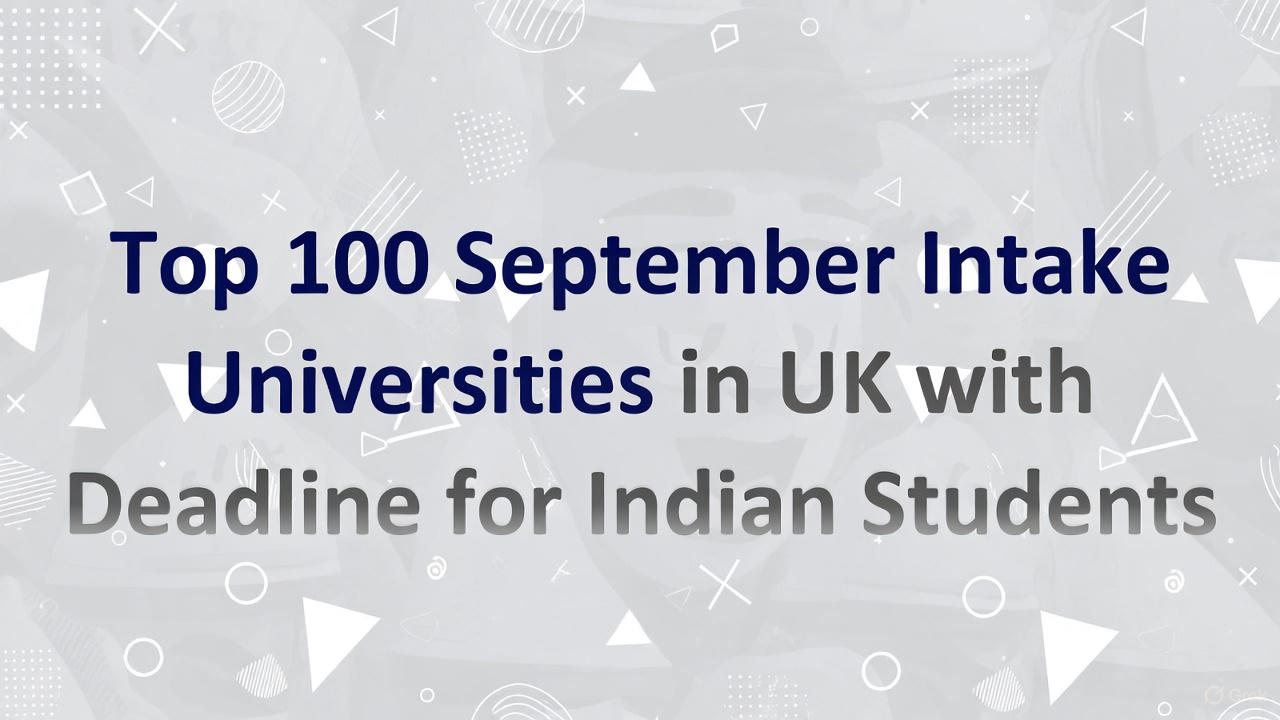Table of Content
- Overview
- Benefits of Studying in the UK for International Students
- UK Application Process for Indian Students: An Overview
- Eligibility and Entry Requirements for UK Universities
- Tuition Fee and Costs of Studying in the UK for Indian Students
- Living Cost to Study in UK Universities
- Student Visa Requirement and Process to Apply for Visa
- Work Permit for Indian Students in UK Universities
- Conclusion
- FAQ
How to Apply to a University in UK? - Overview
Are you ready to unleash your potential at one of the UK’s top universities? Our team of experts is here to guide you every step of the way for How to Apply to a University in UK? With years of experience and in-depth knowledge, we’ll help you find the right programme based on your interests, academic background, and career goals. From choosing the right course to securing scholarships and applying, we’ll make the process smooth and stress-free. Let us help you turn your UK education dreams into reality. Get in touch today and take the first step towards an unforgettable academic journey!
Benefits of Studying in the UK for International Students
When we talk about the benefits of studying in UK for International students you will receive so many different answers. And all of them are true! Yes, studying in UK has a lot of benefits. Now, let’s check what are the benefits of studying in the UK for International students:
Academic Excellence
Studying in the UK offers international students access to world-class education, research opportunities, and a variety of study options. With bachelor’s degrees typically lasting three years and master’s programmes lasting one year, students can quickly gain valuable knowledge and skills. UK universities are ranked among the best in the world, giving students a competitive advantage in the job market.
Career Advancement
A UK degree boosts your employability, as international employers value UK qualifications highly. Students benefit from networking opportunities, career support services, and help with placements. A post-study work visa allows graduates to stay in the UK for up to two years, providing valuable work experience.
Cultural Diversity and Personal Growth
The UK’s vibrant multicultural environment fosters cultural diversity, language skills, and personal growth. Students gain independence, confidence, and self-reliance while making lifelong friends from diverse backgrounds. Exploring Europe and beyond is within reach, creating unforgettable experiences.
Financial Incentives
There are a variety of scholarships available for international students, and tuition fees are competitive compared to other English-speaking countries. Living costs outside of London are also lower, and students can work part-time for up to 20 hours a week. These advantages make studying in the UK an attractive option.
Additional Benefits
International students also have access to the UK’s National Health Service (NHS), dedicated student support services, and a safe learning environment. A streamlined student visa application process simplifies the entry process. With its unique combination of academic rigor, cultural diversity, and personal growth, studying in the UK is a transformative experience that sets students up for success.
UK Application Process for Indian Students: An Overview
Applying to UK universities can be a daunting task, but with the help of our experts, Indian students can navigate the process with ease and confidence. Our team provides personalized advice and application strategies, leveraging in-depth knowledge of UK universities and courses to improve your chances of admission. We streamline, track, and follow up with universities to ensure timely submission of applications. Our expertise also extends to securing scholarships and funding, visa application support, and pre-departure and post-arrival guidance. With years of experience and a proven track record of successful recruitment, our dedicated team fosters strong relationships with UK universities. Partner with us to maximize your admission chances and secure your future in the UK. Contact us today to start your UK education journey!
Step 1: Initial Consultation (Weeks 1-2)
- Schedule a consultation with our expert counselors.
- Discuss academic goals, course preferences, and university options.
- Receive personalized guidance on the UK application process.
Step 2: Course and University Selection (Weeks 3-4)
- Shortlist 3-5 UK universities and courses aligned with your interests.
- Review university rankings, course curriculum, and post-study opportunities.
- Finalize your university and course selections.
Step 3: Document Preparation (Weeks 5-8)
- Gather required documents:
- Academic transcripts and certificates
- English language proficiency test scores (IELTS/TOEFL)
- Statement of Purpose (SOP)
- Letters of Recommendation (LOR)
- Passport
- Ensure documents meet UK university requirements
Step 4: Application Submission (Weeks 9-12)
- Submit applications to selected universities through UCAS or direct application portals
- Pay application fees (ranging from £20-£150)
- Track application status and respond to university queries
Step 5: Scholarship and Funding Applications (Weeks 13-16)
- Research and apply for scholarships, bursaries, and financial aid
- Submit additional documents, if required (e.g., essays, CV)
- Receive scholarship decisions and plan accordingly
Step 6: Visa Application (Weeks 17-20)
- Apply for a Tier 4 student visa
- Provide biometric data and attend an interview (if required)
- Receive visa decision and collect the biometric residence permit
Step 7: Pre-Departure Briefing (Weeks 21-24)
- Attend a comprehensive pre-departure briefing
- Discuss travel arrangements, accommodation, and UK life
- Receive essential information on student life and university support
Step 8: Post-Arrival Support
- Ongoing support during studies in the UK.
- Assistance with accommodation, registration, and induction.
- Regular check-ins to ensure academic and personal well-being.
By following these steps, Indian students can ensure a seamless and successful UK application process. Our expert consultants are here to guide you every step of the way.
Eligibility and Entry Requirements for UK Universities
The first step in “How to Get Admission in UK Universities for Indian Students in 2025” is to find the right university. Applicants can find out by matching their interests and courses, which can be easily found on the university’s website. Once the applicant is clear about the degree and course they want to pursue, they should check the eligibility criteria and requirements. It is important to note that the eligibility and requirements for an undergraduate program will be different from a postgraduate program. Next, the applicant should check the eligibility and admission requirements of that university for Indian students.
Undergraduate Studies
To pursue undergraduate studies in the UK, Indian students must meet certain eligibility criteria. Typically, students must be 17-18 years of age and have completed 10+2 or equivalent (eg CBSE, ICSE, State Boards) with a minimum of 60-80% aggregate, depending on the university requirements. Proficiency in English is also mandatory, with IELTS scores ranging from 6.0 to 7.0 or TOEFL scores ranging from 80-100. Some universities may require standardized tests such as SAT/ACT or subject-specific tests.
Postgraduate Studies
For postgraduate studies, Indian students must have a Bachelor’s degree from a recognized university with a minimum of 55-65% aggregate. English language proficiency requirements are higher, with IELTS scores ranging from 6.5 to 7.5 or TOEFL scores ranging from 90 to 110. Relevant work experience may be required for some courses, and standardized tests such as GMAT/GRE may be required for business, management, or finance programs. Additional requirements include a personal statement, letters of recommendation, and research proposals for Masters/PhD programs.
Additional Requirements for Specific Courses
Some courses, such as medicine, dentistry, and veterinary medicine, require UCAT/BMAT tests, work experience, and voluntary work. Law courses may require LNAT tests, work experience, and internships. Engineering and technology courses often require proficiency in mathematics and science, along with relevant work experience.
Tuition Fee and Costs of Studying in the UK for Indian Students
The duration of study in the UK is relatively shorter than courses in other countries. For example, in the UK, the duration of an undergraduate degree is three years, and the duration of a postgraduate degree is one year. This helps in reducing the overall cost of education in the country. The average cost of studying in the UK per year is as follows:
| Category | Cost Range (GBP/year) | Cost in INR/year (approx.)* |
| Undergraduate Programs | £10,000 - £20,000 | ?10,00,000 - ?20,00,000 |
| Postgraduate Programs | £12,000 - £25,000 | ?12,00,000 - ?25,00,000 |
| MBA Programs | £20,000 - £50,000 | ?20,00,000 - ?50,00,000 |
| PhD Programs | £13,000 - £30,000 | ?13,00,000 - ?30,00,000 |
| Foundation Courses | £6,000 - £12,000 | ?6,00,000 - ?12,00,000 |
| Accommodation (On-campus) | £3,000 - £7,000 | ?3,00,000 - ?7,00,000 |
| Accommodation (Off-campus) | £4,000 - £10,000 | ?4,00,000 - ?10,00,000 |
| Living Expenses | £10,000 - £15,000 | ?10,00,000 - ?15,00,000 |
| Health Insurance (IHS) | £470/year (approx.) | ?47,000 |
| Visa Application Fee | £363 | ?36,300 |
| Books and Study Materials | £500 - £1,000 | ?50,000 - ?1,00,000 |
| Transportation | £1,000 - £1,500 | ?1,00,000 - ?1,50,000 |
Living Cost to Study in UK Universities
Studying in the UK can be expensive, but careful planning can help manage expenses. Living costs vary depending on location, lifestyle and university. On average, international students need £12,000-15,000 per year for living expenses, excluding tuition fees. In London, costs range from £15,000-20,000 per year, while smaller cities such as Manchester, Leeds or Birmingham are relatively affordable at £10,000-14,000. Expenses include accommodation (£6,000-10,000), food (£3,000-4,000), transport (£1,000-2,000) and miscellaneous costs (£1,000-2,000). Scholarships, part-time jobs, and budgeting can help offset these costs. Additionally, students should consider opening a UK bank account and purchasing health insurance to access the National Health Service (NHS). Effective financial planning will ensure a comfortable and enjoyable study experience in the UK.
Student Visa Requirement and Process to Apply for Visa
Eligibility Criteria
To study in the UK, international students must meet certain eligibility criteria. A valid passport, Confirmation of Acceptance for Study (CAS) from a UK university, and proof of English language proficiency (IELTS/TOEFL/PTE) are mandatory. In addition, students must provide academic qualifications and transcripts, proof of financial resources (£12,000-15,000 per year), and health insurance.
Required Documents
Students must gather and submit various documents, including:
- Valid passport
- CAS from UK university
- English language proficiency test results
- Academic qualifications and transcripts
- Proof of financial resources
- Health insurance
- Police registration certificate (if required)
- Biometric data (fingerprints)
Student Visa Application Process
Step 1: Prepare documents
Students must prepare documents and ensure they comply with UK Visas and Immigration guidelines. Translate non-English documents if necessary.
Step 2: Apply online
Apply online and pay the application fee (£348-455). Book a biometrics appointment.
Step 3: Attend your biometrics appointment
Attend your appointment at an approved UK Visas and Immigration centre and provide your biometrics.
Step 4: Provide additional documents
Provide additional documents if requested and attend an interview if required.
Step 5: Receive your visa decision
Receive your visa decision by email and collect your Biometric Residence Permit (BRP).
Timeline and Visa Types
Apply three months before your course start date. Get your visa decision within three weeks (regular visa) or one week (priority). The UK offers two main types of visa: the Tier 4 (General) Student Visa and the Tier 4 (Child) Student Visa.
Important Notes
Check the UKVI website for updates and guidance. Ensure you submit an accurate and complete application. Keep a valid passport and visa. Adhere to UK immigration rules and regulations.
Advice
For personal guidance and assistance with your student visa application process, speak to our expert advisors. We will help you ensure a smooth and successful application.
Work Permit for Indian Students in UK Universities
Indian students studying at UK universities can apply for a work permit, also known as a Tier 2 or Tier 5 visa, after completing their studies. The Post-Study Work (PSW) visa allows graduates to stay in the UK for up to two years to gain work experience. Eligible students must hold a valid Tier 4 visa, have completed a UK degree, and meet certain requirements. Part-time and full-time work opportunities are available, with no restrictions on job roles or salary. This permit provides valuable work experience, enhances employability, and leads to permanent residency or settlement in the UK.
Conclusion
I hope this guide on How to Apply to a University in UK will help you. Study in UK is a great option especially when you choose the correct overseas education consultants. Choose us as your study in UK consultants and get admission without any hassle. We will help you to choose the university, and courses, and also clear your IELTS or other English proficiency test. Contact us today through the inquiry form or WhatsApp. You can also call us on +91 7877512818.
FAQ
Que 1: What are the requirements to study in the UK?
Ans. - To study in the UK, Indian students need a valid passport, Confirmation of Acceptance for Study (CAS), English language proficiency, academic qualifications, and proof of financial resources.
Que 2: How long does the UK student visa process take?
Ans. - The UK student visa process usually takes 3-4 weeks, but may vary depending on individual circumstances; apply 3 months before your course start date.
Que 3: Can I work part-time while studying in the UK?
Ans. - Yes, international students can work part-time for up to 20 hours/week during term time and full-time during holidays, with a valid Tier 4 student visa.
Que 4: What is a Post-Study Work (PSW) visa in the UK?
Ans. - A Post-Study Work (PSW) visa allows graduates to stay in the UK for up to two years to gain work experience, convert to a work visa or pursue entrepreneurship.
Que 5: How much does it cost to study in the UK?
Ans. - Tuition fees range from £10,000 to £30,000 per year; living costs range from £12,000 to £15,000 per year; scholarships and financial aid are available.
Que 6: Can I bring my family to the UK while studying?
Ans. - Dependent family members can accompany students, but they need to apply for separate visas and meet specific requirements.
Que 7: What are the best universities in the UK?
Ans. - The best universities in the UK include Oxford, Cambridge, Imperial College London, University of London and the University of Edinburgh.
Que 8: How do I apply for scholarships at UK universities?
Ans. - Check the websites of universities, UK government scholarships, and external funding organizations; apply with the required documents.
Que 9: Can I transfer credits from an Indian university to a UK university?
Ans. - Credits are transferable, but it depends on the university’s policies and course compatibility.
Que 10: What support services are available to international students in the UK?
Ans. - UK universities offer language support, academic guidance, career advice, and mental health services.







Leave a Reply